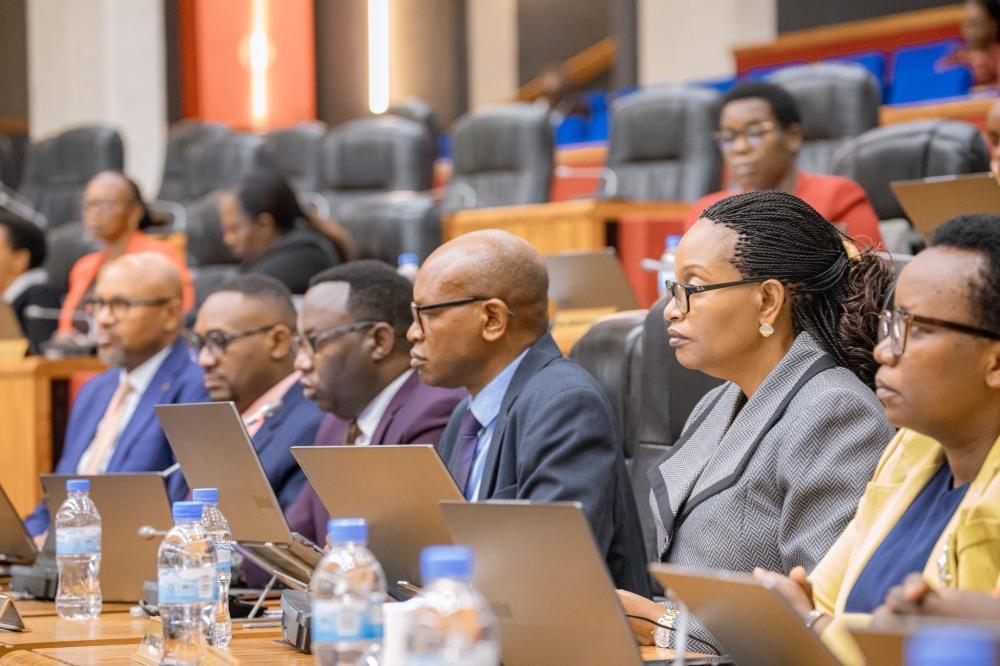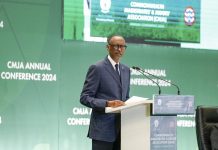Africa-Press – Rwanda. Members of Parliament on September 15 adopted a resolution condemning the European Parliament’s recent call for the immediate and unconditional release of Victoire Ingabire.
Lawmakers denounced the EU resolution as interference in Rwanda’s judiciary and a violation of the country’s sovereignty.
Ingabire was arrested in June 2025 on charges of forming a criminal group and planning to incite public disorder.
The European Parliament’s September 11 resolution on the case of Victoire Ingabire claims the charges pressed against her are politically motivated and part of a broader crackdown on opposition figures, demanding that they be dropped.
Lawmakers denounced the EU resolution as interference in Rwanda’s judiciary and a violation of the country’s sovereignty. courtesy
In a joint plenary session on September 15, the Senate and the Chamber of Deputies approved a resolution rejecting the EU’s stance. The decision followed a detailed review of the EU resolution by Parliament’s standing committees – in the Senate and the Chamber of Deputies – on political and governance affairs.
Presenting the analysis report, Senator Usta Kaitesi, Chairperson of the Senate’s Committee on Political Affairs and Governance, said the EU resolution was based on distorted and biased information.
“The resolution reflects the views of certain politicians and countries that have consistently shown hostility toward Rwanda and its leadership,” Kaitesi said. “It undermines the independence of our judiciary and disrespects Rwanda’s democratic institutions and global standing.”
MPs respond to specific EU claims
MP Pie Nizeyimana criticised the EU Parliament’s reference to Ingabire as the leader of the DALFA-Umurinzi party, saying the organisation is not legally recognised as a political party in Rwanda.
Also, he said, according to Rwandan law, anyone previously sentenced to more than six months in prison is ineligible to lead a legally registered political party, referring to Ingabire’s earlier imprisonment.
Ingabire was previously sentenced to 15 years in prison in 2013 for crimes including inciting masses to revolt against the government and minimising the 1994 Genocide against the Tutsi, though she was later granted early release in 2018, on presidential parole.
Nizeyimana said that the resolution shows a lack of understanding and respect for Rwanda’s legal framework and goes far beyond acceptable diplomatic conduct.
He also rejected the EU’s assertion that there is no political freedom in Rwanda.
“I lead a political party legally recognised in Rwanda. I express my views freely, as do others — provided that we respect the rights of fellow citizens,” said Nizeyimana, who is chairman of the Democratic Union of the Rwandan People (UDPR).
MP Yvonne Mujawabega said that the EU resolution violated core principles of international law, including the UN Charter’s principle of sovereign equality among nations.
“Each country has the right to manage its internal affairs without external pressure,” she said. “This resolution is a clear attempt to interfere with Rwanda’s judiciary, and it disregards established legal processes.”
Resolution affirms sovereignty and judicial independence
The lawmakers agreed that the European Parliament’s resolution overstepped its bounds and undermined mutual respect between nations.
They called on international partners to respect Rwanda’s sovereignty, refrain from political interference, and uphold the independence of national institutions – especially the judiciary.
The adopted resolution reaffirms Rwanda’s status as a sovereign democratic republic governed by the rule of law. It highlights the independence of the judiciary, which Parliament emphasised must be protected from external interference.
The Rwandan resolution also calls for mutual respect in international partnerships and development cooperation.
According to Parliament, its resolution will be submitted to several international institutions, including the European Parliament, the Council of the European Union, the European Commission, all EU member states, the African Union, the United Nations, and the Government of Rwanda.
For More News And Analysis About Rwanda Follow Africa-Press






